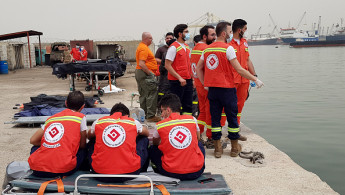250 migrants from Lebanon stranded in EU waters without food or water
About 250 migrants from Lebanon are stranded after running out of fuel in Maltese waters on Monday night, with aid groups urging for their rescue by nearby naval authorities.
The migrants, which departed from Lebanon about a week ago, have not had access to food and water for four days and are in "difficult conditions," Consolidated Rescue Group, a Swedish migrant-aid group, told The New Arab.
Another search and rescue group, Alarm Phone, said that one passenger told the group that his 3-month-old daughter had died from thirst.
Aid groups had urged Maltese authorities to send a rescue vessel to the ship but had yet to receive a response. The Maltese Armed Forces had not replied to The New Arab's request for comment by the time of publishing.
Instead, SOS Germany, a German search and rescue group, had sent one of their vessels to try to find and rescue the migrants. The rescue ship, Humanity 1, was located between Malta and Crete at the time of publishing.
"According to international maritime law and UN conventions, the state responsible for the area of competence should take care of every single emergency they face at sea, facilitating and coordinating with all the assets available to render assistance," Juan Matias Gil, the head of Mission of Doctors Without Borders Search and Rescue Operations in the Central Mediterranean, told The New Arab.
Passengers on the ship told Alarm Phone on Tuesday that a cargo ship, the Morning Carol, passed by and did not respond to their requests for assistance. The New Arab could not independently verify this claim, but online tracking data showed the Morning Carol in the vicinity on Tuesday.
"Every single vessel at sea has the obligation to respond to calls of distress. It doesn't matter where the source is coming from. This is not happening, merchant vessels are avoiding rendering assistance, even when they acknowledge the situation," Gil said.
The stranded vessel is the latest in a series of ships from Lebanon filled with migrants searching for an escape from the country's punishing economic crisis. Since 2019, more than two-thirds of the country has been mired in poverty and basic services have ceased to function due to the economic meltdown.
Last week, on 4 September, a ship of about 60 migrants from Lebanon had to be rescued and taken to Crete after their boat stalled. One child died after falling severely ill on the journey.
Lebanese authorities frequently stop migrants from leaving its territorial waters. In April, a boat carrying 80 migrants sank off the coast of Tripoli after colliding with a Lebanese Navy ship.
European authorities have responded to the influx of migrants from states like Lebanon, Turkey and Libya with increasingly aggressive border policies. Human rights groups have criticised the policy of pushback adopted by many EU border states such as Greece.
"What is happening in the Central Mediterranean is a part of the strategy of deterrence policies by the EU and their member states. Not responding to distresses at sea no doubt causes more deaths at sea," Gil said.





 Follow the Middle East's top stories in English at The New Arab on Google News
Follow the Middle East's top stories in English at The New Arab on Google News


